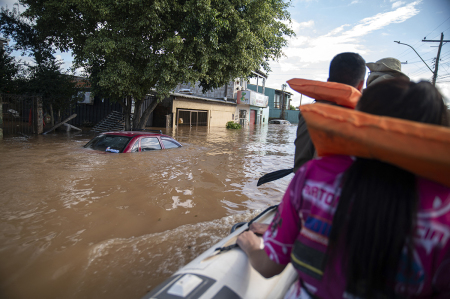Churches serving as shelters as over 500K displaced, at least 136 dead; Samaritan’s Purse, Operation Blessing send aid

Local churches across southern Brazil have opened their doors to provide shelter and aid to residents in areas of the country that have been devastated by catastrophic floods that have claimed the lives of at least 136 people and left around 537,000 displaced.
Working with their partners on the ground, U.S.-based Evangelical humanitarian groups Samaritan’s Purse and Operation Blessing's International Disaster Relief Team have also initiated relief operations.
Operation Blessing has set up three kitchens to feed as many as 6,000 people a day. The nonprofit's advance team, which is comprised of members from Virginia Beach, Honduras, Costa Rica, Puerto Rico, El Salvador and Chile, arrived Thursday in Novo Hamburgo, one of the hardest hit areas. They are also preparing hygiene kits and cleaning supplies that will be delivered to temporary shelters where residents are staying after evacuating their homes.
“Operation Blessing’s International Disaster Relief team has been in some of the world’s worst flooding disasters, and what we are seeing right now in Brazil is among the most dire,” said Jorge Pratts, deployment manager. “We assessed the flooding by boat and in one town, only the rooftops of multi-story buildings are seen above the water. Residents are still stranded, especially those with mobility issues. The water is heavily contaminated, there are mosquitoes with Dengue and Zika, and a lot more rain is in the forecast. The scope of this disaster is massive.”
Samaritan's Purse has airlifted tons of essential supplies to the state of Rio Grande do Sul, which has been devastated by the catastrophic floods.
The nonprofit's 757 cargo plane departed from the Airlift Response Center in North Carolina to deliver essential items such as personal water filtration systems, hygiene kits, blankets, solar lights and 10 community water filtration systems capable of providing clean drinking water for up to 10,000 people each day.
“Please continue praying for all those whose lives have been devastated by this flooding as even more heavy rains are on the way,” said Samaritan’s Purse President Franklin Graham.
The floods, triggered by heavy rains that began on April 27, have inundated towns, destroyed infrastructure and left over 1.4 million residents without electricity.
Samaritan’s Purse has also deployed a Disaster Assistance Response Team to Porto Alegre, the state capital, to coordinate a disaster response with local authorities and church networks.
Vatican News reported that the disaster, affecting over 400 cities, marks the state’s worst climatic crisis.
Bishop Cleonir Paulo Dalbosco of Bagé described the extensive community efforts, including food and hygiene kit collections by churches that are now serving as distribution centers and shelters.
The bishop’s comments were reflected in local responses in towns like Bento Gonçalves, where floods have been particularly destructive. Father Leonardo Inácio Pereira, from the Parish of São Pelegrino in Caxias do Sul, spoke of the community’s efforts to rescue and provide for the displaced. “We’re giving shelter to a group of 25 senior citizens who lived at a nursing home,” he was quoted as saying.
In Porto Alegre, Roselaine da Silva and her three children, including one with autism, are among the 70,000 people displaced by the floods. They have found refuge in an Evangelical church, accompanied by their two dogs, the BBC reported. However, Roselaine had to leave her two cats in their flooded home in the Sarandi neighborhood.
In her temporary bedroom at the church, Roselaine, surrounded by donated clothing and other displaced families, finds solace in the generosity of strangers who have provided shelter to those affected by the floods, the BBC noted, adding that the Evangelical church in the city’s northern area serves as a crucial support center for dozens of families like Roselaine’s, who are sheltered in its halls.
“We offer four meals a day, hot showers, medical and psychological assistance,” Pastor Dari Pereira was quoted as saying. “But the demand keeps growing, and we ran out of space. We now have to relocate people to other shelters.”
Porto Alegre Mayor Sebastião Melo has been forced to impose water rationing, with significant parts of the city, including water treatment facilities, severely impacted, The Associated Press reported. The situation has pushed residents like Maria Vitória Jorge to seek safer accommodations far from her flooded downtown apartment, the newswire said.
Meanwhile, Brazilian President Luiz Inácio Lula da Silva, alongside other high-ranking officials, visited the region to assess the damage and coordinate federal response efforts. The president acknowledged the agricultural impact, particularly to rice production, a staple in the Brazilian diet, indicating potential future imports to stabilize the food supply.
Pope Francis has also extended support, allocating 100,000 euros to aid those affected. The financial assistance will be managed by the National Episcopal Conference of Brazil’s South 3 Region, according to Vatican News.
Public health experts have raised concerns about potential disease outbreaks, with conditions ripe for dengue fever and leptospirosis. The ongoing crisis has left the state grappling with the monumental task of recovery and rebuilding, a process expected to redefine urban planning and disaster preparedness in the region.





















